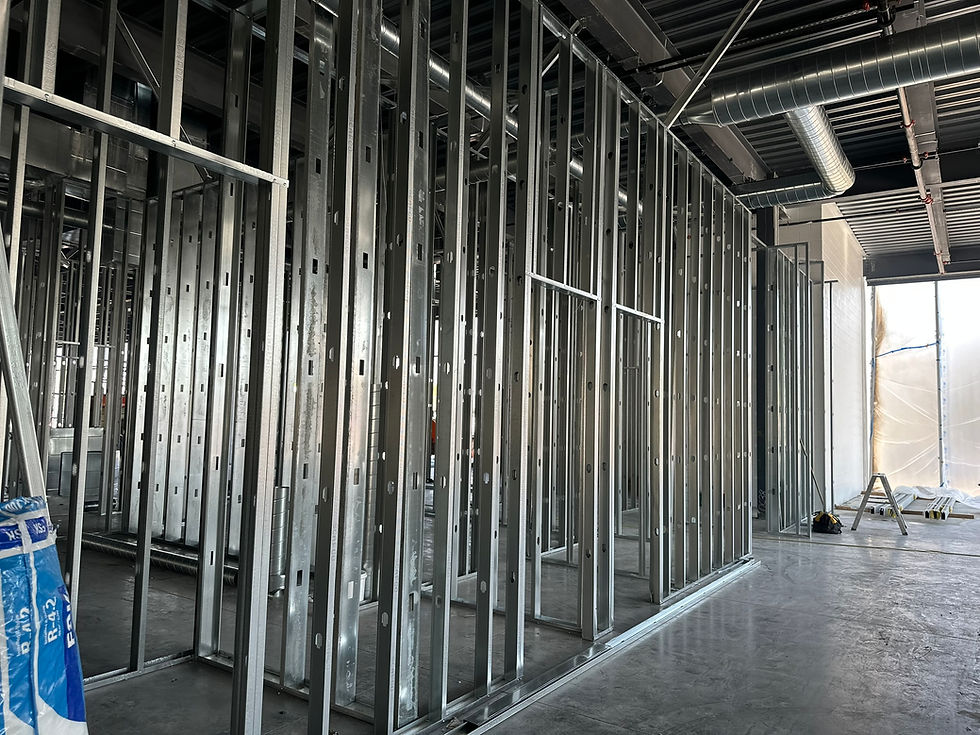Streamlining Construction: The Essential Role of Material Handlers
- H&D Construction

- Jul 3, 2024
- 3 min read
In the fast-paced world of construction, efficiency and productivity are critical. The ability to move bulk materials quickly and safely can make all the difference in keeping projects on schedule and within budget. Enter material handlers—machines specifically designed to handle and transport bulk materials such as metal studs, drywall, and ceiling tiles. Let's explore the essential role of material handlers in construction and understand why they are indispensable for material handling operations.
What are Material Handlers?
Material handlers are specialized machines equipped with various attachments designed to lift, carry, and transport bulk materials. Unlike general-purpose equipment, material handlers are optimized for handling large quantities of specific materials used in construction, such as metal studs, drywall sheets, and ceiling tiles. Their robust design and powerful hydraulics make them capable of handling heavy loads with ease.
Key Applications of Material Handlers
1. Moving Metal Studs
Metal studs are essential components in modern construction, providing structural support for walls and ceilings. Material handlers can efficiently transport bundles of metal studs from storage areas to the installation site. With attachments like forks and clamps, these machines ensure that metal studs are moved quickly and safely, minimizing the risk of damage or injury.
2. Handling Drywall Sheets
Drywall installation is a common task in both residential and commercial construction. Drywall sheets are bulky and can be challenging to move manually. Material handlers equipped with specialized attachments can lift and transport multiple sheets at once, streamlining the material handling process. This not only speeds up installation but also reduces the physical strain on workers.
3. Transporting Ceiling Tiles
Ceiling tiles are delicate materials that require careful handling to avoid damage. Material handlers with appropriate attachments can safely transport stacks of ceiling tiles to the installation area. Their precision and control ensure that the tiles remain intact, maintaining their quality and appearance.
Advantages of Material Handlers
1. Increased Efficiency
Material handlers significantly increase efficiency on construction sites. By automating the transportation of bulk materials, these machines reduce the time and labor required for material handling tasks. This allows workers to focus on installation and other critical activities, accelerating project timelines.
2. Enhanced Safety
Safety is a top priority in construction. Material handlers are designed with features that prioritize operator and site safety. Their stability, controlled movement, and specialized attachments minimize the risk of accidents and injuries associated with manual material handling. Additionally, operators receive training to ensure safe and effective use of the equipment.
3. Versatility
Material handlers are versatile machines capable of handling a variety of materials with different attachments. Whether it's lifting heavy pallets, transporting fragile tiles, or moving large bundles of metal studs, material handlers can be adapted to suit the specific needs of the task. This versatility makes them invaluable assets on any construction site.
4. Reduced Material Damage
Handling bulk materials manually can lead to damage, especially with delicate items like drywall and ceiling tiles. Material handlers provide precise control and gentle handling, reducing the likelihood of damage during transportation. This helps maintain the quality of materials and reduces waste, contributing to cost savings.
In the construction industry, where time, efficiency, and safety are paramount, material handlers play a crucial role in streamlining operations. Specifically designed for moving bulk materials such as metal studs, drywall, and ceiling tiles, these machines enhance productivity and ensure the safe and efficient handling of materials. As construction projects continue to grow in complexity and scale, material handlers will remain essential tools, driving progress and ensuring that materials are delivered to their destination quickly, safely, and intact. By investing in material handlers, construction companies can optimize their operations and achieve greater success in every project.




Comments